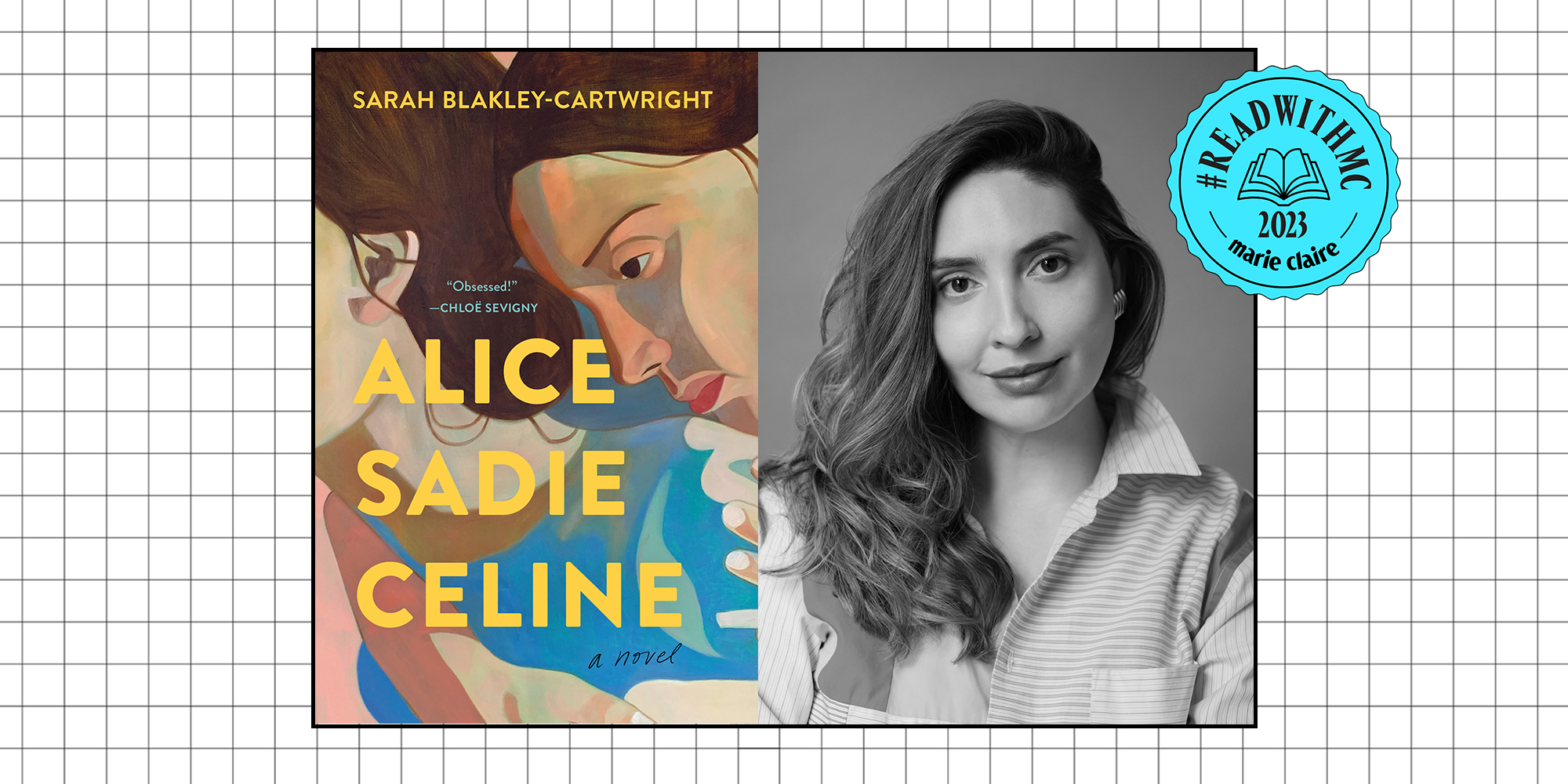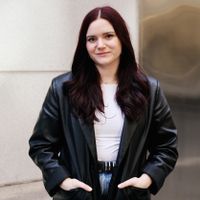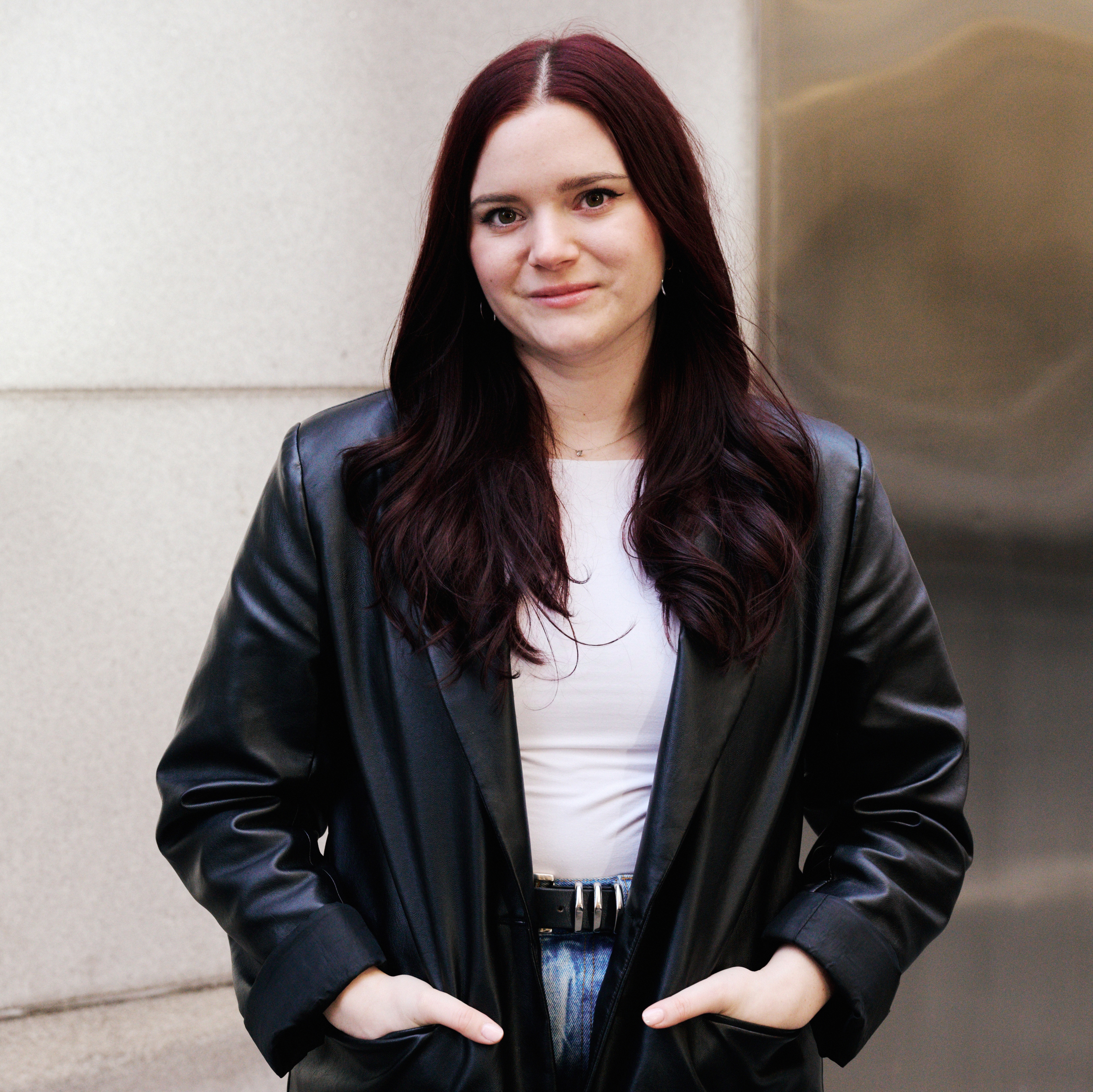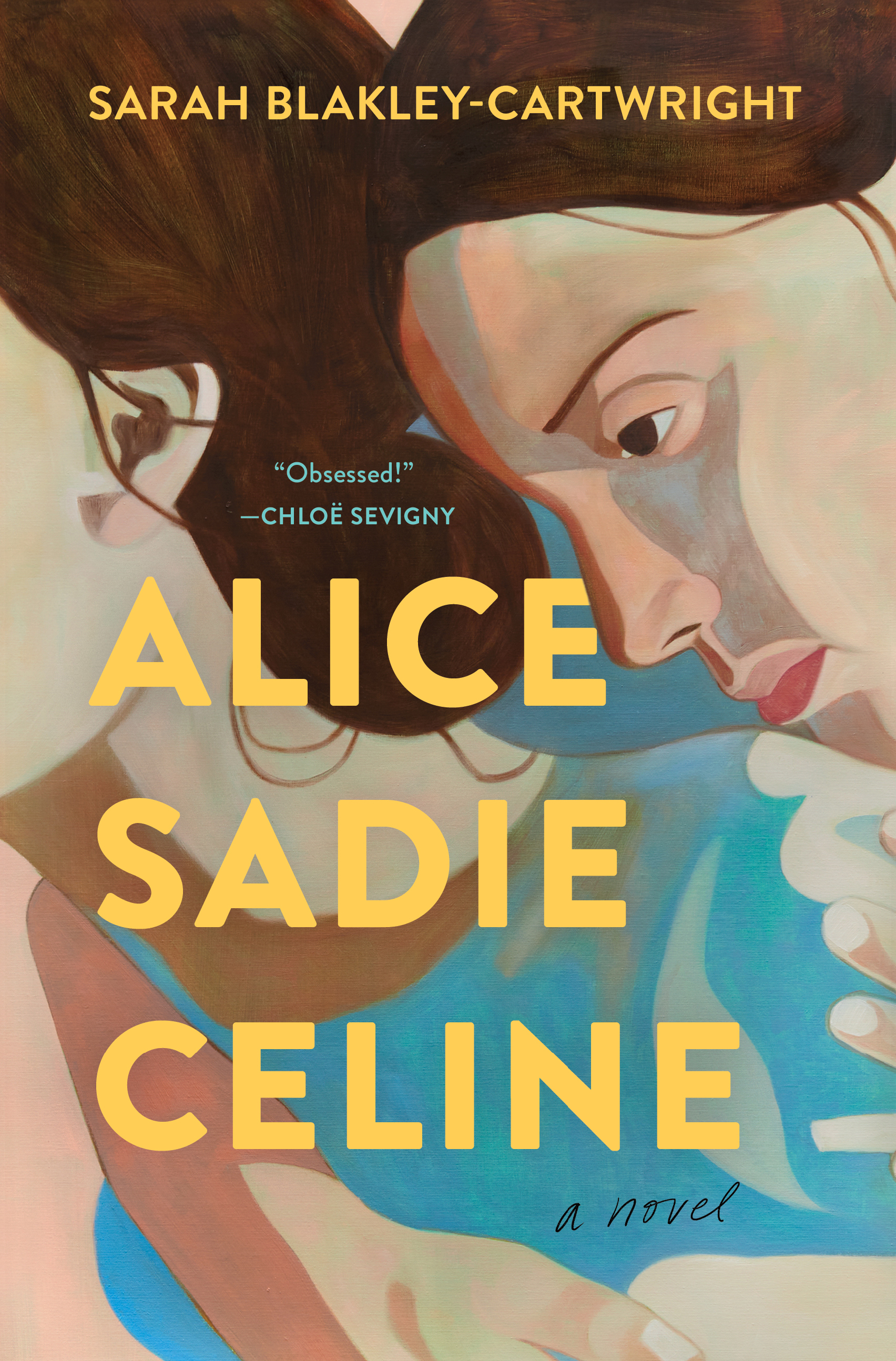'Alice Sadie Celine' Is Our December Book Club Pick
Read an excerpt of Sarah Blakley-Cartwright's novel, here, then dive in with us throughout the month.


Welcome to #ReadWithMC—Marie Claire's virtual book club. It's nice to have you! In December, we're reading Sarah Blakley-Cartwright's Alice Sadie Celine, a seductive novel following a woman's affair with her daughter's best friend that tests the limits of their love and beliefs. Read an excerpt from the book below, then find out how to participate. (You really don't have to leave your couch!)
The morning after the weekend’s final show, heavy-lidded, Alice blinked awake to the foreign click of the Airbnb’s Timex wall clock. She felt remarkably free of concern, despite the heat, extraordinarily rested. It was not until she rolled over, the lumpy futon unforgiving beneath her, that Celine was live and robust beside her.
“Hello.” Celine’s lizard-wide eyes were right there, unblinking, looking straight into hers.
Alice’s blurry mind jolted, her organs radiated, thinking back to the night before. They had made it to the bed before abandoning it for the shower’s cool running water, then for the chair in front of the rotating fan, then for the chilly kitchen floor, then for the refreshing marble kitchen countertop.
“My God.” Alice clapped her hand over her mouth. She toppled back against the pillows. She flipped onto her back and stared feebly at the ceiling.
“Hi.”
Alice thrust out her shaky, uncertain hand, wondering if her charm could possibly smooth an iota of the regret Celine must be feeling. “Who are you again?” she asked, parodying confusion. “Hi, I’m Alice.”
Get exclusive access to fashion and beauty trends, hot-off-the-press celebrity news, and more.
Celine grinned like a demon at the gag. What could they possibly do but laugh? As she accepted Alice’s hand, Alice felt she was signing a dangerous pact.
Celine looked at her squarely. “Are you okay?”
Alice blinked. “No.”
It was strange. Alice felt not so much regret, her own, as a cringing feeling that Celine must be feeling a gut-wrenching remorse.
“It’s going to be painful for a minute.”
“Okay.”
There was something disconcerting in the way Celine would not avert her eyes.
“One, two, three, four . . .” Celine counted to sixty. It took a long, long time. “Are we better?”
“No,” Alice said, but like a bizarre miracle, she was. She steadied herself by looking out at the bay, at the row of bridges shrouded in morning mist. Celine murmured how, as the day’s temperature rose, the tidal waters, essentially, cooked. It seemed such a sensible thing to say. Alice found herself enjoying Celine’s quiet company. She had never seen Celine be quiet before.
The two women stayed moored in the queen-size bed. Alice, keyed into Celine, could tell she preferred not to break the spell. When Celine asked if she should go, Alice said, “Not yet.” She felt she was on a ship, afloat at extremity, far from everyone she knew.
“Trick question. I was hoping you’d say that.”
Eventually they did make it out of bed. Alice slipped on her vintage housedress, which Celine said was “a little Rosemary’s Baby.” They emptied half a tray of ice cubes into their palms. Celine poured the other half into a bucket and made Alice a clacking foot bath. They groaned. “How can it be this hot at eight in the morning?”
They did not plug in the toaster. As if hungover, they devoured cold bagels and mulchy bananas left as a courtesy by the Airbnb host. They remarked on how the bananas felt velvety on the tongue. Celine counted Alice’s freckles, losing track every thirty or so and starting again. Everything was new as a baby. The sunlight flooded in. A flock of starlings murmured, showing off their trim shipshape, tidy as Navy Blue Angels. Alice kept waiting for things to feel weird. They didn’t. Was that weird?
While Celine tended to her Monday morning emails and brewed a fresh pot of coffee, Alice slipped into the shower. She turned tightly in the narrow stall, encased in steaming hot, soaping herself under the prickling water, aiming the nozzle, adjusting the setting to a consistent high pressure. It was her first moment alone and she tried to collect herself. She scrubbed, trying to wash something off. Trying to wash off Celine? No, trying to wash off Sadie.
Sadie, who had been so elusive in the first place. She had been a mystery on their high school campus, invisible at the lunch break, not deigning to arrive until thirty seconds before class began, slipping down the aisle in Bio II like a celebrity shy of exposure, just as Mr. Cady had begun distributing brick-sized fetal pigs from bags of formaldehyde (How had they died? Had they been bred for the piteous purpose?) with a gigantic pair of steel tongs. Though Sadie could easily have landed among them, with one hand tied behind her back, she was not one of the campus’s commonplace “cool kids,” which made her cooler.
Alice and Sadie met already bonded, exchanging a small, lopsided smile after both nearly missed the shuttle for the Food Waste Tour, a high-school-wide field trip, in which they learned to spawn mushrooms in coffee ground waste. Missing the bus would require a Herculean journey by public transport.
Both girls, late, dashed and made it, tumbling onto the chartered bus just as it shuddered into jerky action. The happenstance meeting was a rare time Sadie was caught off-guard, teetering off-balance as the tired coach bus bumped into action over the Caltrain railway tracks.
Moving swiftly, Sadie had commented on (was it a compliment?) Alice’s Fugazi sweatshirt, the moth-eaten collar crenellated with wear. To this day, Alice had never confessed she had only borrowed it from a guy, though she did— sensing that Sadie was someone worth impressing—go home and study Repeater that night, trying to decode its cacophony. And then Alice concurred when Sadie complained about the shuttle, stopping off at the Banway Building rather than cutting straight to Kittridge parking, grumbling about its inefficiency.
On the Food Waste Tour, Sadie listened to the volunteer docents with her head poised at a slight three-quarter angle, Alice thought, like the patron sitter in a Flemish portrait. “So elegant,” Alice said, seeing Sadie unsheathe a skinny gold retractable pencil from a velvet-lined case.
Sadie sized Alice up, looking her over to ascertain whether she would actually be interested. She was conspiratorial, handing Alice the pencil. “It’s the Smythson Viceroy wafer.”
Alice admired it. “My mother uses Blackwings.”
“Go ahead,” Sadie said. “Try it.”
“That is fantastic,” Alice said, trying out a spiral and her own name, then Sadie’s. “Better than a Caran d’Ache. Smoother.”
Alice kept waiting for things to feel weird. They didn’t. Was that weird?
Sadie positively radiated. And after that they were friends, consecrated, without any throat-clearing. They skipped all the clamor of straining to establish that they wanted to be friends. They just were. They wandered the warehouse together, noses pinched, Sadie mostly stone-faced but laughing sometimes. Fallen in with each other over a precocious connoisseurship about pencils.
The friendship was all-encompassing and, without even realizing it was happening, Alice gradually withdrew from her former friends. Plain, plumb forgot until she ran into one or another outside the science lab or the Monterey Bay Aquarium and faced a chilly reception. Until Teague called out, “Dumpling-shaped ho!” and slid diagonally, sharklike, toward her across the Math Building hallway. Alice could not help but admire this insult. Heart pumping, smiling just a little, safe in her new and superior friendship, she had ducked into a classroom.
When Alice saw Teague’s posts now, they were of weekend parties in the desert. Itchy, sun-withered blankets, dry heat, bodies on the floor, drugs. Alice felt she had dodged a bullet.
Everyone was constantly falling in fervent love with Alice—even people who shouldn’t. In elementary school, two girls played tug-of-war with her on the schoolyard, to determine who she would sit with at lunch. Literally grabbed her by her arms and yanked. But Sadie wasn’t one of her annoyingly easy hangers-on.
Alice still wasn’t sure how she had been selected for the privilege of Sadie’s friendship, admitted to the most exclusive club of one. She loved Sadie’s looks, her long nose and sharp jaw. She had none of the asymmetry that characterized Celine’s face. She was rumored to be judgmental and standoffish. All the other kids were intimidated by Sadie, with her imposing bearing, ramrod posture, and composure of a sphinx.
With a patrician air, Sadie’s every gesture was eloquent. Different from Alice, who conserved no energies, gesticulating widely. The funny thing was that their great-grandparents could have met. Both families had traced their lines to Ohio, Alice’s paternal side bearing early industrialists, processing tobacco in the 1810s, and Sadie’s, more loosely, as Irish migrants working the meatpacking floors. “My great-grandmother could have scrubbed yours’s boots,” Sadie said.
Celine had come from nothing, really. To Alice’s mind, it rendered her doubly impressive. In childhood photos, Alice smiled, cradling her stuffed bunny, Felty, with their family’s tartan ribbons looped into her hair, procured during a recent trip to Scotland. Sadie was severe, dressed in gray tones, with what was now called a power part slicing a vertical line from her crown to her hairline. But something about the contrast clicked.
Copyright © 2023 by Sarah Blakley-Cartwright. From the forthcoming book ALICE SADIE CELINE: A Novel by Sarah Blakley-Cartwright to be published by Simon & Schuster, Inc. Printed by permission.

Brooke Knappenberger is the Associate Commerce Editor at Marie Claire, where she specializes in crafting shopping stories—from sales content to buying guides that span every vertical on the site. She also oversees holiday coverage with an emphasis on gifting guides as well as Power Pick, our monthly column on the items that power the lives of MC’s editors. She also tackled shopping content as Marie Claire's Editorial Fellow prior to her role as Associate Commerce Editor.
She has over three years of experience writing on fashion, beauty, and entertainment and her work has appeared on Looper, NickiSwift, The Sun US, and Vox Magazine of Columbia, Missouri. Brooke obtained her Bachelor's Degree in Journalism from the University of Missouri’s School of Journalism with an emphasis on Magazine Editing and has a minor in Textile and Apparel Management.
